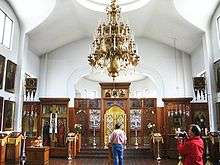Divine Service (Eastern Orthodoxy)

Divine Service is the term used in the Eastern Orthodox Church to describe the daily cycle of public services celebrated in the temple (church building).
The word may be used also of the Divine Liturgy, though its normal connotation is the Daily Office. For Orthodox Christians, the serving of God in divine worship is an obligation of every Christian. This obligation involves both private and public worship.[1]
In Orthodox theology, the first divine service was offered by Adam and Eve together in the Garden of Eden.[2] In Paradise, divine worship consisted of freely glorifying God, which came naturally to them as a result of their unimpeded theoria (vision of God in his Divine Energies). After the Fall of man, this theoria became clouded, and worship required effort on the part of man. Now divine service was accomplished in the form of sacrificial offerings, penance and prayer. These sacrifices were later codified in the Law of Moses. Thence forward, only specific offerings were made, by specific persons (priests), in a specific manner, and at a specific place (eventually, the Temple in Jerusalem), and specific liturgical days and feasts were instituted. In Orthodox theology, any efficacy in these Old Testament sacrifices is dependent upon the sacrifice of Christ on the Cross.[2]
After the Resurrection of Jesus and Pentecost, the Early Church originally continued to participate in the rites of the Jewish Temple (Acts 2:46-47; 3:1; 5:21, etc.), in addition to their own celebrations of the Eucharist and agape feasts. But after the Second Destruction of the Temple by the Romans in 70 AD, Christians began to develop their own distinct forms of worship. They did retain, however, some elements of Old Testament worship (chanting of the Psalms, use of incense, etc.) and the setting aside of specific times of the day for worship (Psalm 119:147-148; 119:164).
These periods of prayer eventually developed into seven distinct services, held (a) during the three major periods of the day (evening, morning, and noonday) and (b) during the night watches.
Services
The liturgical celebrations that make up the divine services of the Orthodox Church are:
- Vespers—Evening worship, the beginning of the liturgical day
- Compline—Final service before retiring to sleep
- Midnight Office—Celebrated in the middle of the night, or at least before Matins
- Matins—The morning office, served so as to end at dawn with the chanting of the Lauds
- First Hour—Chanted in the first hour of daylight (approx. 6:00 am)
- Third Hour—Chanted in the third hour of daylight (approx. 9:00 am)
- Sixth Hour—Chanted at midday (approx. 12:00 pm)
- Ninth Hour—Chanted in the ninth hour of daylight (approx. 3:00 pm)
All of these services are traditionally celebrated by all members of the church (with the exception of the Midnight Office, which is a specifically monastic office). However, today the full cycle of divine services are usually only celebrated in cathedrals and large monasteries.
The seven services (excluding Midnight Office) developed in part from the daily services in the Temple in Jerusalem, partly from the Jewish services in the Synagogue, and partly from the cultural influences of the various areas wherein the services developed.[3] (most notably the Holy Land, Egypt and Constantinople). The number seven is derived from Psalm 119:164 "Seven times a day will I praise Thee for Thy righteous judgements." However, another psalm says, "Evening, morning and noonday will I praise Thee." (Psalm 55:17). For this reason, the tradition developed of grouping the seven services into three aggregates. Thus, there are three major times of prayer during the day. Though the particular services which make up the three aggregates will differ based on the feast day being celebrated, and the season of the liturgical year, the most common aggregation is as follows:
- Evening—Ninth Hour, Vespers, Compline
- Morning—(Midnight Office), Matins, First Hour
- Noonday—Third Hour, Sixth Hour, Divine Liturgy
The Divine Liturgy is not technically a part of the daily cycle of services, since theologically, the celebration of the Eucharist takes place in eternity. It is also not served daily in most parishes and smaller monasteries. However, when it is served, it is usually scheduled into the noonday aggregate.
See also
References
- ↑ Pomazansky, Protopresbyter Michael (1984), "Prayer", Orthodox Dogmatic Theology: A Concise Exposition (Tr. Hieromonk Seraphim Rose), Platina, Cal.: Saint Herman of Alaska Brotherhood, p. 309, LC 84-051294
- 1 2 Slobodskoy, Archpriest Seraphim (1996), "The Concept of Serving God, Divine Service", The Law of God, Jordanville, N.Y.: Holy Trinity Monastery, p. 523, ISBN 0-88465-044-8
- ↑ Cabrol, F. (1912), "Christian Worship", The Catholic Encyclopedia, XV, New York: Robert Appleton Company, retrieved 2007-12-30